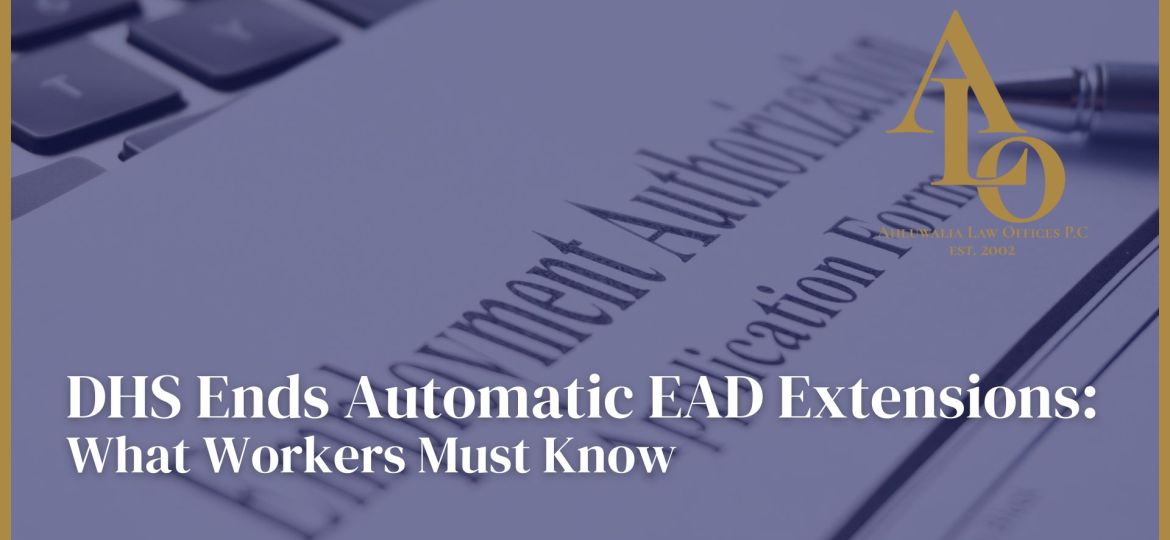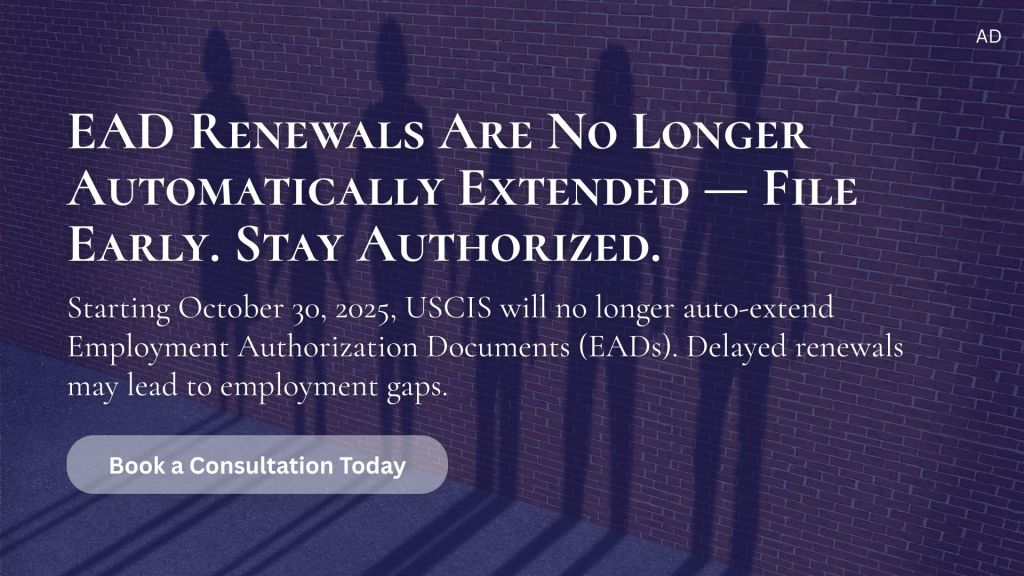
Overview of the New Rule
On October 29, 2025, the Department of Homeland Security (DHS) announced an interim final rule ending the practice of automatically extending Employment Authorization Documents (EAD) for certain foreign nationals who apply to renew them. Beginning October 30, 2025, individuals who file for EAD renewals will no longer receive an automatic extension of work authorization while their renewal applications are pending. DHS stated this change is designed to enhance national security and fraud prevention by requiring more frequent background vetting.
Who Is Affected
The policy affects foreign nationals in multiple categories, including:
- Adjustment of status applicants (Form I-485) waiting for green cards;
- H-4, L-2, and E-2 dependent spouses who apply for EAD renewals;
- DACA and TPS holders, except where specific Federal Register notices provide extensions; and
- F-1 students working under Optional Practical Training (OPT) with pending EAD renewals.
The exceptions to this rule are narrow and primarily apply to:
- Automatic extensions authorized by statute, and
- Temporary Protected Status (TPS) categories when a Federal Register notice specifically provides extended work authorization.
Why the Policy Changed
According to USCIS Director Joseph Edlow, the previous policy “prioritized convenience ahead of Americans’ safety and security.” The agency’s intent is to ensure that every renewal is reviewed for eligibility and background compliance before granting continued employment authorization.
This means DHS and U.S. Citizenship and Immigration Services (USCIS) will perform fresh vetting at each renewal to detect fraud, national security risks, or changes in an applicant’s admissibility.
Practical Implications for Visa Holders
Ending automatic extensions could cause employment gaps if renewals are not filed early. USCIS recommends filing renewal applications up to 180 days before EAD expiration to avoid lapses.
H-4 or L-2 Spouse
If your current EAD expires on April 1, 2026, you should file your ren3ewal no later than October 2025. Without an automatic extension, failure to renew early could mean you must stop working until USCIS issues a new card.
Adjustment of Status Applicant
Applicants with pending green card cases under Form I-485 often rely on EADs for continued employment. Under the new rule, if your renewal is filed late or takes longer to process, your work authorization may lapse—impacting your job and even your lawful presence.
DACA or TPS Beneficiary
While DACA recipients will be subject to this rule, some TPS holders may still qualify for extensions under country-specific Federal Register notices. Always check the notice corresponding to your TPS designation.
Recommended Steps for Employers and Employees
- Plan renewals early: File at least 150–180 days before your current EAD expires.
- Track expiration dates using HR or personal compliance software.
- Maintain copies of all USCIS receipts to show proof of timely filing.
- Consult your attorney if you have multiple pending immigration applications (e.g., H-4 + I-485 EADs).
- Employers should update Form I-9 procedures and prepare for potential lapses in employee work authorization.
Client Advisory: How Ahluwalia Law Offices Can Help
Our firm has successfully represented thousands of professionals, families, and investors through employment-based and family-based immigration processes. With this new rule in effect, timing and strategy are critical.
If you currently hold or depend on an EAD for your work authorization—particularly under H-4, L-2, F-1 OPT, or pending adjustment status—we strongly recommend scheduling a consultation to review your renewal timeline.
Book a consultation today to ensure your work authorization remains uninterrupted and your renewal is filed in compliance with the latest DHS policy.


